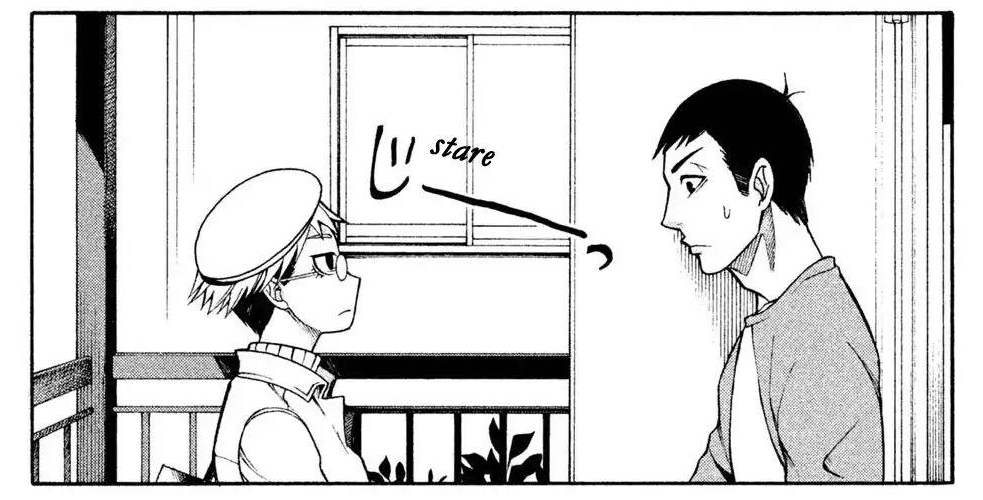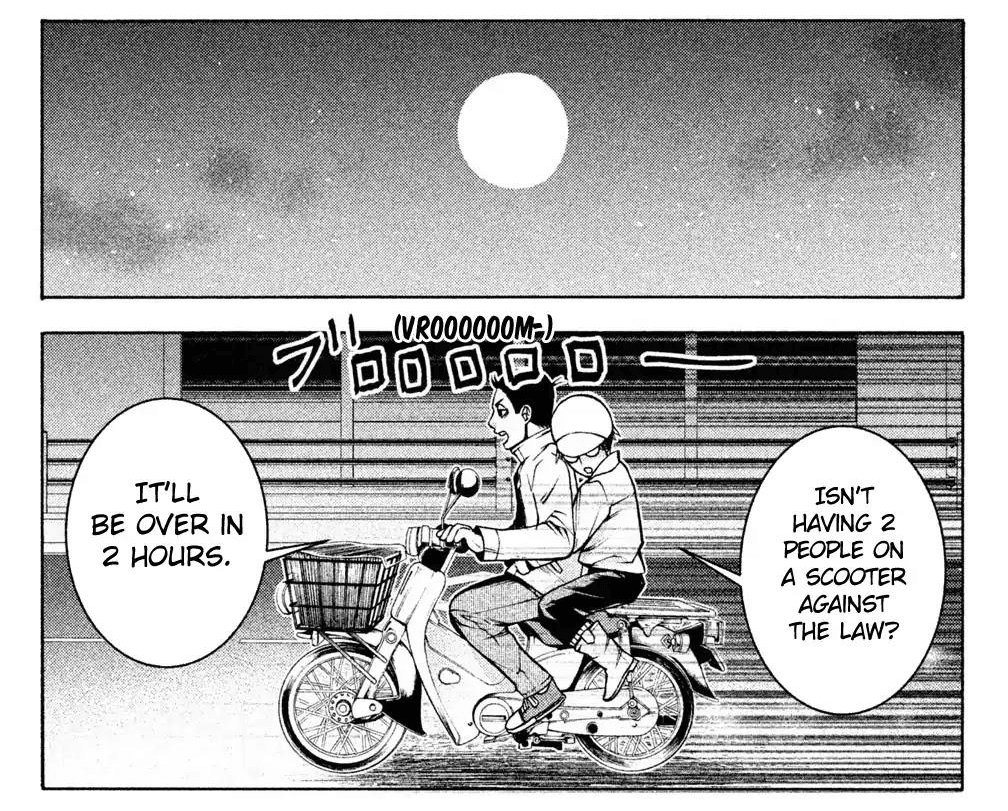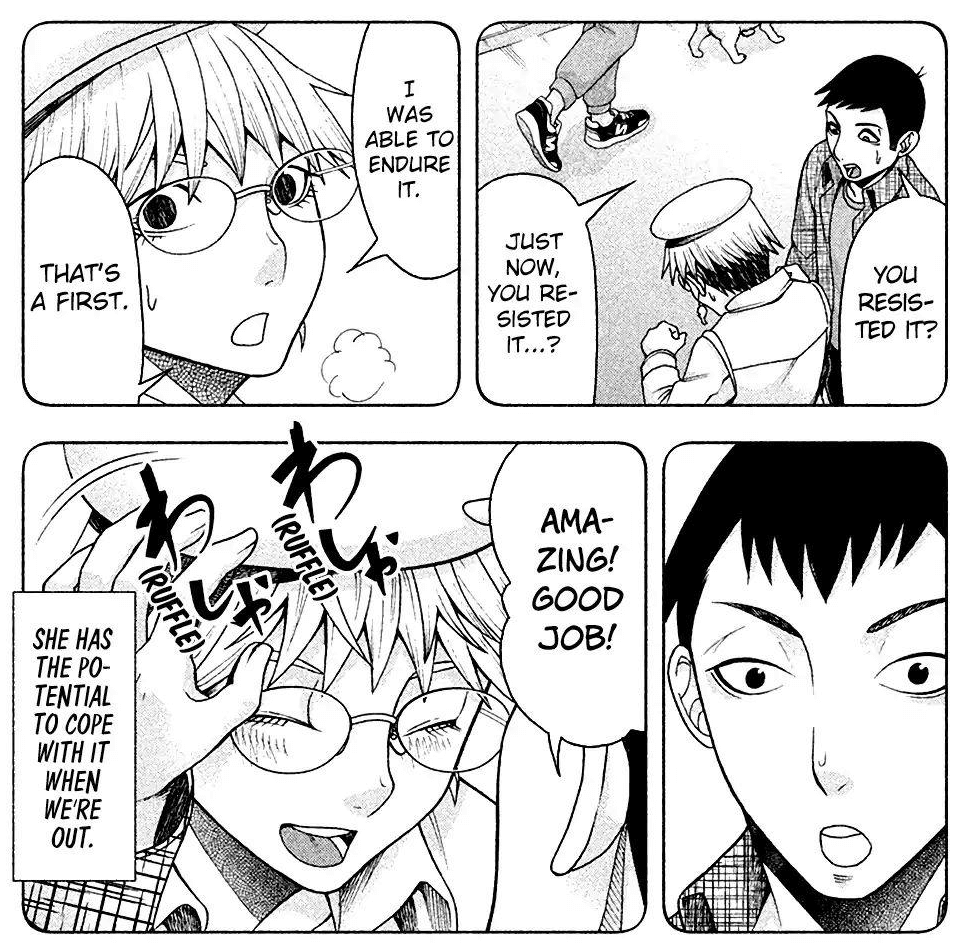
That's My Atypical Girl
アスペル・カノジョ
(Asper Kanojo)
Reviewed on: June 23, 2024
1st time read
Genre: Slice of Life, Romance, Drama
Written by: Souhachi Hagimoto
Art by: Renji Morita
Volumes: 12 (100 chapters)
CONTENT WARNING:
suicide, self-harm, ableism,
sexual harrassment,
child abuse, animal abuse
! DISCLAIMER !
The manga reviewed here revolves around very sensitive topics. I'd recommend checking the content warning on the right before reading the review further or the manga itself.
This review also contains mild spoilers up to around Volume 2.
I do not believe these early spoilers will negatively affect your experience. Regardless, you've been warned.
! EXTRA CONTEXT !
As the Japanese title implies, the term Asperger's is used to describe autistic characters in this manga. As of 2013, the term Asperger's has been phased out by the DSM-5 and is now under the umbrella of Autism Spectrum Disorder. However, some neurodivergent people originally diagnosed with Asperger's still prefer to use the label. This review will be using the term Asperger's and Autism interchangeably.
an atypical love story
Taku Yokoi is a broke, reclusive artist scraping by through a part-time job and by drawing doujinshi. One day, a female fan of his work named Megumi Saitou shows up at his door to meet him. With no intentions of leaving, Yokoi resolves to let Saitou live with him.
Saitou has Asperger's syndrome, OCD, PTSD, and frequent suicidal tendencies. Yokoi, though undiagnosed, shares a lot in common with Saitou, which brings about their bond that is at the core of That's My Atypical Girl. It follows the pair as they face communicative challenges, heal past trauma, and attempt to make personal progress.
Though the plot on paper may sound like the cynical kind of "inspiration porn" we've seen many times, the manga isn't like that at all. Instead it's very genuine and brutally honest in a way that really left an impression on me. If you can stomach the sensitive content and get past the awkward beginning chapters, I'd highly recommend reading this manga to the end.

one step back, two steps forward (in a good way)
The manga has an awkward and somewhat contrived start before you get to the meat of the story. The story is truly a slice-of-life where you watch Saitou and Yokoi get closer, and more importantly, see Saitou slowly heal from her trauma and reintegrate into society. As someone very aware of manga tropes, I was dreadfully prepared for this to be a self-insert romantic fantasy. The kind of book where you can place yourself as the "nice guy" protagonist saving the damsel in distress by being so nice to her it heals her trauma or something.
On the contrary, the book does not glamorize the situation at all. Saitou's trauma doesn't just exhibit through "adorable" quirks like being shy or quiet. She can be insensitive and violent, hyperfocusing on revenge fantasies. To set the tone of what to expect, one of the first chapters has her kick a dog out of perceived self-defense. Saitou is allowed to have genuinely negative traits, but is still treated with respect and humanity, as everything she does has a reason behind it.

The male protagonist, Yokoi, also does not neatly fall into the self-insert archetype. He himself is also heavily implied to be autistic, though undiagnosed, by other characters. He also makes mistakes, has insecurities, and his own struggles with society. He'll usually end up knowing just the right thing to say, but some of the best writing in these books is seeing his thought process as he gets there. The author takes meticulous effort to show us how characters reach conclusions and why they do what they do, and it's fascinating to read.
In general, so much of the manga takes place in the apartment Saitou and Yokoi share, their conversations, and their thoughts. At times, the story feels a bit like a deconstruction of the "heroic romance" story. A major internal conflict throughout is Yokoi not wanting Saitou to be too attached to him for her own sake. But this is contrasted by the confidence boost he gets having someone rely on him so much, and the occasional jealousy from getting that taken away as she becomes more independent. These are messy, morally questionable feelings that the characters are allowed to explore.

You could say that the story follows a loose formula where Saitou will relapse or face an obstacle, we get a flashback of her traumatic past, and then the couple works through it. It's heart-warming to see the characters succeed at bettering themselves, but at the same time the characters will often regress. It's not uncommon for, just when you think everything is going great, Saitou to seemingly take a step back in development. I can see some being annoyed by this but I think it feels real to life. It makes every little victory you get feel all the more rejuvenating, and every step backwards feel just as devastating. But in the end, these occasional relapses don't take away from the overall progress the characters make, and that is really touching to me.
great representation with some shaky execution
Fun fact: If you've met one person with autism, you've met one person with autism. The same applies with most disabilities and mental illnesses, as symptoms can display with different intensities in different ways for everybody. So it's weird most media that tries to represent these topics will just have one neurodivergent character in an all neurotypical cast that is meant to be the sole representative of their condition.
Something I appreciate about That's My Atypical Girl is that we get multiple characters with Asperger's, self-harm tendencies, childhood PTSD, and other conditions; each character has varying support needs too so you get a wide array of perspectives. And all of these neurodivergent people get treated with respect. They are rarely made fun of or humiliated for atypical things they do except by asshole characters you're meant to not side with.

Though, the author often seems to have trouble getting there. Once he establishes a status quo it's great, but he'll have some contrived reasons to introduce characters.
The most egregious example I found is in Volume 2, when a side character with a sex addiction is introduced. The protagonists confront her for the first time, and it immediately cuts to her dropping her entire backstory and condition on to them with little preemptive hesitation. In general, for a cast with a lot of introverted people, characters will be surprisingly quick to open up and drop information that sounds like it came straight out of a medical journal. Though I guess that's not totally untrue to life for a neurodivergent cast. But, it can definitely mess with the pacing.
There are a couple times where a character will kind of go into a "lecture mode" and talk like they're reading a script instead of their usual dialogue style. But, I can't complain too much because it's usually with genuinely helpful and interesting information that is useful to educate on, especially to a neurotypical audience. It can be a bit unbelievable sometimes how Yokoi will know exactly the perfect words to say, but those words will be so touching and well-written that I don't really mind the inconsistency. It's just worth noting.

worth reading to the end
Like I said, the beginning is a bit rough, but you can feel both the writing and the art improve as the chapters go on. In the latter half of the manga, I was getting hit with beautiful visual metaphors and captivating monologues back-to-back. Towards the end, I would hit so many pages that just sucker punched me in the gut with feelings of dread or joy. I would often have to take a break from reading and just pace around my room to take it in. The ending is a bit abrupt, but I think you'll find is satisfactory.
By the end of it, it made me feel inspired to improve my own life. Not in an objectifying kinda way like "I'm so glad I don't have it as bad as them." The characters were human, and went through real character development, and I could see myself using the strategies they used in my own life. The main things I got from the manga is the importance of having a support network, caring for one another, and being able to sympathize with people you never thought you could ever understand.
Neurodivergent or not, I'd recommend this manga if you feel you can handle its potentially triggering subject matter and not-always-likable character actions.

miscellaneous points

- The manga has nudity and sexual scenes rarely, but they aren't fan service-y. They are tastefully drawn and contribute to the plot. Also, it's nice to hear autistic characters openly talk about sex and specific sexual preferences. Autistic people are often infantilized, especially with the subject of sex, and I don't feel that happens here.
- It's not all serious. The slice of life hijinks of Yokoi trying to buy basic commodities were fun and comfy. There's plenty of comedic moments in between as well.
- I'm someone who wasn't diagnosed in childhood, but always knew something was up with me as a kid, so I heavy related to Yokoi. Especially, Chapter 50 where it delves into his childhood. Too relatable (╥_╥)
- Not all the side characters are good. Fuck the landlord's son. Vague spoilers: What purpose did him doing THAT multiple times serve the plot? The landlord family subplot in general goes nowhere.
- Ending spoilers: Saitou forgiving Ikegami was the perfect culmination of her character development. And her just turning down the creep from work was satisfying too. I was scared for a second it was gonna go to a darker place. It's a quintessential bittersweet ending and the final flash forward made me teary-eyed.
final recommendation
ONE-BEDROOM APARTMENT/10
If you enjoy: |
|
Relatively short read! Recommend it! |
|---|
If you dislike: |
|
Not for everyone |
|---|